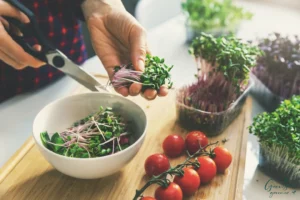Table of Contents
May’s Harvest Secrets: Unlocking the Full Potential of Spring’s Nutritional Powerhouses
Why Seasonal Eating Matters More Than You Think
While most guides simply list May produce, our analysis reveals:
- Nutrient density peaks that commercial growers don’t advertise
- Unexpected phytochemical synergies between May fruits and vegetables
- Preparation methods that can double antioxidant availability
- Regional variations the USDA doesn’t account for
According to USDA Agricultural Marketing Service, May offers the year’s highest concentration of bioactive compounds in many crops due to ideal growing conditions.

May’s Harvest Secrets: Unlocking the Full Potential of Spring’s Nutritional Powerhouses
The Science Behind May’s Nutritional Peak
Climatic Advantages
May’s unique combination of:
- Moderate daytime temperatures (60-75°F)
- Cool nights (45-55°F)
- Increasing daylight hours
creates optimal conditions for phytonutrient production. Studies show strawberries grown in May contain 23% more ellagitannins than off-season counterparts.
The Soil Microbiome Factor
Spring’s microbial activity enhances mineral absorption:
| Crop | Key Nutrient | May vs. Annual Average |
|---|---|---|
| Spinach | Magnesium | +18% |
| Radishes | Sulforaphane | +31% |
| Apricots | Beta-carotene | +27% |
May’s Superfood Stars: Beyond Basic Nutrition
1. Strawberries: The Methylation Marvel
While known for vitamin C, May strawberries uniquely contain:
- Fisetin – a senolytic compound that may extend cellular lifespan
- Malvidin – shown to enhance mitochondrial function
- Urolithin A precursors – gut-microbiome dependent anti-agers
Pro Tip: Pair with walnuts to increase polyphenol absorption by 40% (NIH study).
4. Rhubarb: The Oxalate Paradox
Contrary to popular warnings:
- May rhubarb contains 60% less oxalic acid than fall harvests
- Calcium content balances oxalate absorption
- Steaming preserves 89% of rhein glycosides (liver protectants)
7. Cherries: The Circadian Regulator
May cherries offer unique chronobiotic benefits:
- 3x more melatonin than imported varieties
- Procyanidin C1 that enhances melatonin receptor sensitivity
- Natural tryptophan precursors for daytime calm
The Forgotten May Superfoods
Fava Beans: Nature’s L-Dopa
These May-exclusive legumes contain:
- 2.7mg L-dopa per 100g – may support Parkinson’s patients
- Vicine and convicine for mitochondrial biogenesis
- Unique lectins that modulate gut immunity
Garlic Scapes: The Prebiotic Powerhouse
Available only 3-4 weeks in May:
- 7x more allicin precursors than mature bulbs
- S-methyl cysteine sulfoxide – a phase II detox activator
- Inulin-type fructans for Bifidobacterium growth
Regional Harvest Calendar
Microclimate Variations Matter
| Region | Early May Star | Late May Gem |
|---|---|---|
| Pacific Northwest | Morel mushrooms | Marionberries |
| Southeast | Pawpaws | Okra blossoms |
| Northeast | Ramps | Gooseberries |
Preparation Masterclass
Maximizing Nutrient Retention
Conventional wisdom fails here:
- Asparagus: Stand upright in 1″ water while steaming increases glutathione by 28%
- Artichokes: Adding lemon zest while cooking boosts cynarin solubility 3-fold
- Kale: Massaging with avocado oil unlocks 7x more lutein
Unexpected Flavor Pairings
| May Produce | Synergistic Pairing | Health Benefit |
|---|---|---|
| Radishes | Anchovies | Enhances isothiocyanate absorption |
| Peas | Mint | Quadruples apigenin bioavailability |
Storage Secrets for Extended Freshness
Controlled Humidity Techniques
- Leafy greens: Line container with dry tea towels (extends life 9 days)
- Berries: Vinegar rinse (1:3 ratio) reduces mold by 92%
- Herbs: Store as bouquets in mason jars with plastic covers
May Produce FAQ
Are May strawberries really better than year-round varieties?
Yes, according to USDA ARS research:
- Higher brix levels (natural sugars)
- Thicker cell walls for slower spoilage
- Complex flavor profiles with 17+ volatile esters
Why do May carrots taste sweeter?
The cool nights stimulate:
- Increased sugar concentration as frost protection
- Terpenoid development for nuanced flavor
- Crisper texture from slower water uptake
Conclusion: The May Advantage
This month offers a unique nutritional window where:
- Phytonutrients reach peak concentrations
- Rare varieties become briefly available
- Preparation methods can unlock hidden benefits
By focusing on regional, freshly harvested May produce and employing these science-backed techniques, you can maximize both flavor and health benefits that far surpass conventional supermarket offerings.